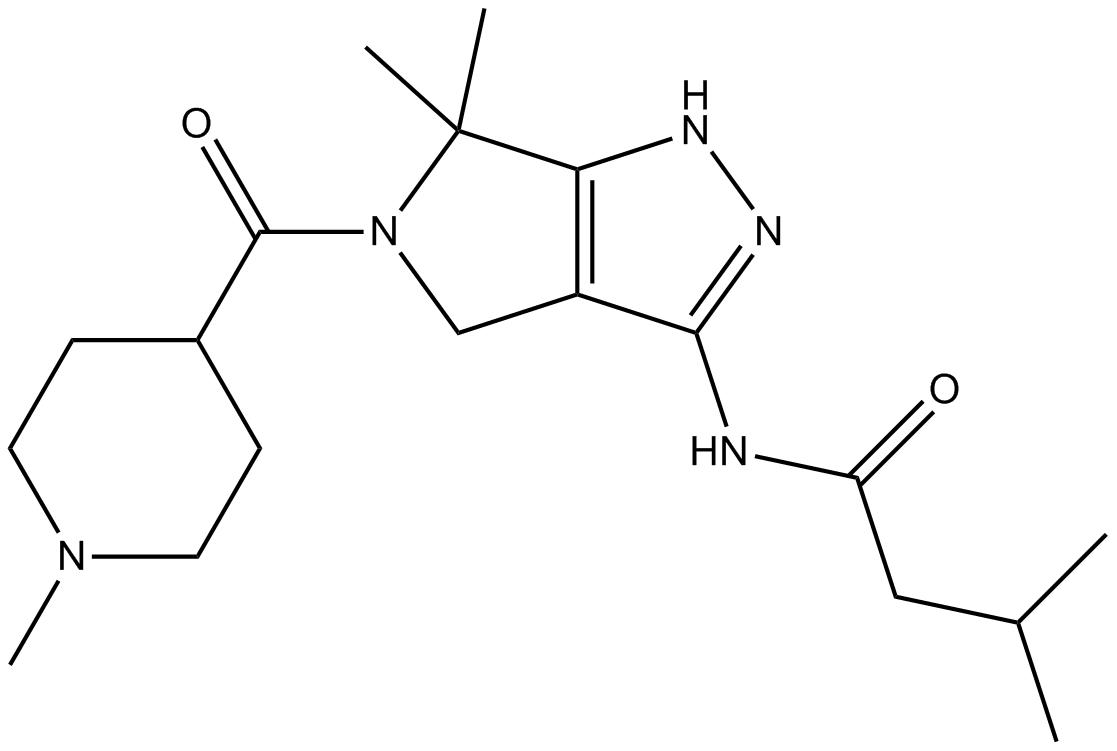PHA-793887 |
| Catalog No.GC15047 |
Pan-Cdk inhibitor
Products are for research use only. Not for human use. We do not sell to patients.

Cas No.: 718630-59-2
Sample solution is provided at 25 µL, 10mM.
Description:
IC50: PHA-793887 is a novel and potent inhibitor of CDK2, CDK5 and CDK7 with IC50 values of 8 nM, 5 nM and 10 nM, respectively.
Cyclin dependent kinases (CDKs) are a family of serine/threonine kinases that, in concert with cyclins (positive regulators) and natural inhibitors (CDKI), control the cell cycle progression.1Deregulation of the activity of CDKs, mainly due to alterations of expression and/or genetic mutations of cyclins, CDKs, CDKIs and other components of the retinoblastoma protein (pRB) pathway, has been reported in more than 90% of human neoplasms.
In vitro: PHA-793887 was found to be cytotoxic for leukemic cell lines in vitro, with IC50 ranging from 0.3 to 7 μM (mean: 2.9 μM), regardless of any specific chromosomal aberration. At these doses, the drug was not cytotoxic for normal unstimulated peripheral blood mononuclear cells or CD34+ hematopoietic stem cells. Moreover, in colony assays PHA-793887 showed very high activity against leukemia cell lines, with an IC50<0.1 μM (mean: 0.08 μM), indicating that it has efficient and prolonged antiproliferative activity. PHA-793887 induced cell-cycle arrest, inhibited Rb and nucleophosmin phosphorylation, and modulated cyclin E and cdc6 expression at low doses (0.2-1 μM) and induced apoptosis at the highest dose (5 μM) [1].
In vivo: PHA-793887 was also effective in vivo in both subcutaneous xenograft and primary leukemic disseminated models that better mimic naturally occurring human disease. Interestingly, in one disseminated model derived from a relapsed Philadelphia-positive acute lymphoid leukemia patient, PHA-793887 showed strong therapeutic activity also when treatment was started after establishment of high disease burden. Thus, PHA-793887 has promising therapeutic activity against acute leukemias in vitro and in vivo [1].
Clinical trial: A first in man, phase I dose-escalation study indicates that although toxicity was acceptable at initial dose levels, PHA-793887 was poorly tolerated at doses≥44 mg/m2. The most frequent events across all dose levels were gastrointestinal or nervous system events. DLTs were experienced by two of three patients at the dose level of 66 mg/m2, and by three of nine patients at the dose level of 44 mg/m2. In all but one patient the DLT was hepatotoxicity; fatal hepatorenal failure was seen in one patient treated at the 44 mg/ m2 dose level. There were no objective responses, but disease stabilization was observed in five patients. Over the dose range investigated, pharmacokinetic studies showed that systemic exposure to PHA-793887 increased with the dose and was time-independent. The study terminated after the enrolment of 19 patients due to the severe hepatic toxicity. These findings shows that PHA-793887 induces severe, dose-related hepatic toxicity, which was not predicted by pre-clinical models and currently precludes its further clinical development [2].
References:
[1] Alzani R, Pedrini O, Albanese C, Ceruti R, Casolaro A, Patton V, Colotta F, Rambaldi A, Introna M, Pesenti E, Ciomei M, Golay J. Therapeutic efficacy of the pan-cdk inhibitor PHA-793887 in vitro and in vivo in engraftment and high-burden leukemia models. Exp Hematol. 2010;38(4):259-269.e2.
[2] Massard C, Soria JC, Anthoney DA, Proctor A, Scaburri A, Pacciarini MA, Laffranchi B, Pellizzoni C, Kroemer G, Armand JP, Balheda R, Twelves CJ. A first in man, phase I dose-escalation study of PHA-793887, an inhibitor of multiple cyclin-dependent kinases (CDK2, 1 and 4) reveals unexpected hepatotoxicity in patients with solid tumors. Cell Cycle. 2011;10(6):963-70.
Average Rating: 5 (Based on Reviews and 8 reference(s) in Google Scholar.)
GLPBIO products are for RESEARCH USE ONLY. Please make sure your review or question is research based.
Required fields are marked with *




















